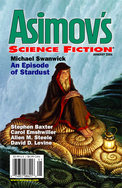
| Editor: | Sheila Williams |
| Issue: | Volume 30, No. 1 |
| ISSN: | 1065-2698 |
| Pages: | 144 |
This issue was a very mixed bag, a bit short on ideas and long on character development and exploration. I found many of the stories a bit obvious and straightforward; not bad, exactly, but not as complex as I was hoping. The non-fiction material was also a bit disappointing, mostly because I wasn't interested in Silverberg's topic for this issue (food). Paul Di Filippo's book column is up to his usual standards, however.
"An Episode of Stardust" by Michael Swanwick: A fairy tale of sorts set in a world better populated in different species than ours, both fantastic and anthropomorphic animal. The characters are con artists, but the cons are not particularly inventive. The twist rests in a literal interpretation of magic, cute but not horribly original. Good fun, not memorable. (6)
"In the Space of Nine Lives" by R.R. Angell: This is a psychological story about the turmoil and choices of a lone starship pilot, the middle pilot of a long journey with a frozen cargo, with only an older pilot and the computer for company. It's mostly a coming of age story built around the pilot's slow acceptance of his role with the aid of a computer fantasy. I never developed enough attachment or interest in the character to care about his development, though; he started out feeling like a spoiled brat and never seemed to outgrow it. There are some possibly interesting overtones of love, father figures, self-love, and identity, but I didn't care enough about the central plot to want to dig in. (5)
"World of No Return" by Carol Emshwiller: Like much of Emshwiller's writing, this is a quiet-feeling character study about alienness and familiarity, of different perspectives and understandings and how they interact. A stranded alien stumbles into a living arrangement with a senile elderly woman amidst background and memories of his life, and through that woman and her house, reaches an understanding of the world on which he's stranded. It was quietly interesting, although I wanted a little more, somehow. (6)
"The Last McDougal's" by David D. Levine: The retro McDonald's in the future I liked. The body modifications of the future I liked too, as well as the future rebellious teenager attitude. Good setting and an enjoyable mood. However, Levine doesn't do much with that, and the reconciliation brokered by a retro-diner operator, while realistic, isn't much of a punch for a story. This felt like a vignette to illustrate a few unrelated ideas. (6)
"World Without End, Amen" by Allen M. Steele: A mildly interesting premise of an emergent intelligence that takes over benign control of the world and the last disbeliever, one of its creators. The ending is an odd sidle into a happy ending that made me feel like Steele didn't have anything compelling to say about the world other than the idea, but I did enjoy some of the exchanges and dynamic leading up to that. On the other hand, the computer dialogue is cliched and tedious. (5)
"Storm Poet" by Kim Antieau: This character study about a farming family, strange relatives, and the bond between child and parents could have been a mainstream story easily. The fantastic elements (a possible rainmaker and some background details indicating such things are more common in this universe) are easily explained away and far in the background. The real story is about rediscovery of a youthful joy and release of emotions, paralleling the release of rain from the skies. Nice if you like that sort of thing; it's not really to my taste. (5)
"Ghost Wars" by Stephen Baxter: This is a more traditional space opera of a secret mission in a battle against the geometric, space-faring ghosts. The human crew dives into the past of ghost civilization and the motives of its rulers and combatants. It's not bad, for space opera, but the explanations are rather thin. For example, there's clearly enough points of mutual comprehension that the necessity of an absolute war to destruction makes little sense. For another, I never bought the idea of evolution to uniform sphere shape. And the villain finally loses by being unbelievably dumb, followed by a denouement featuring a lot of tedious picking at shallow points. Baxter is a fair writer, but... eh. (5)
Reviewed: 2006-06-09